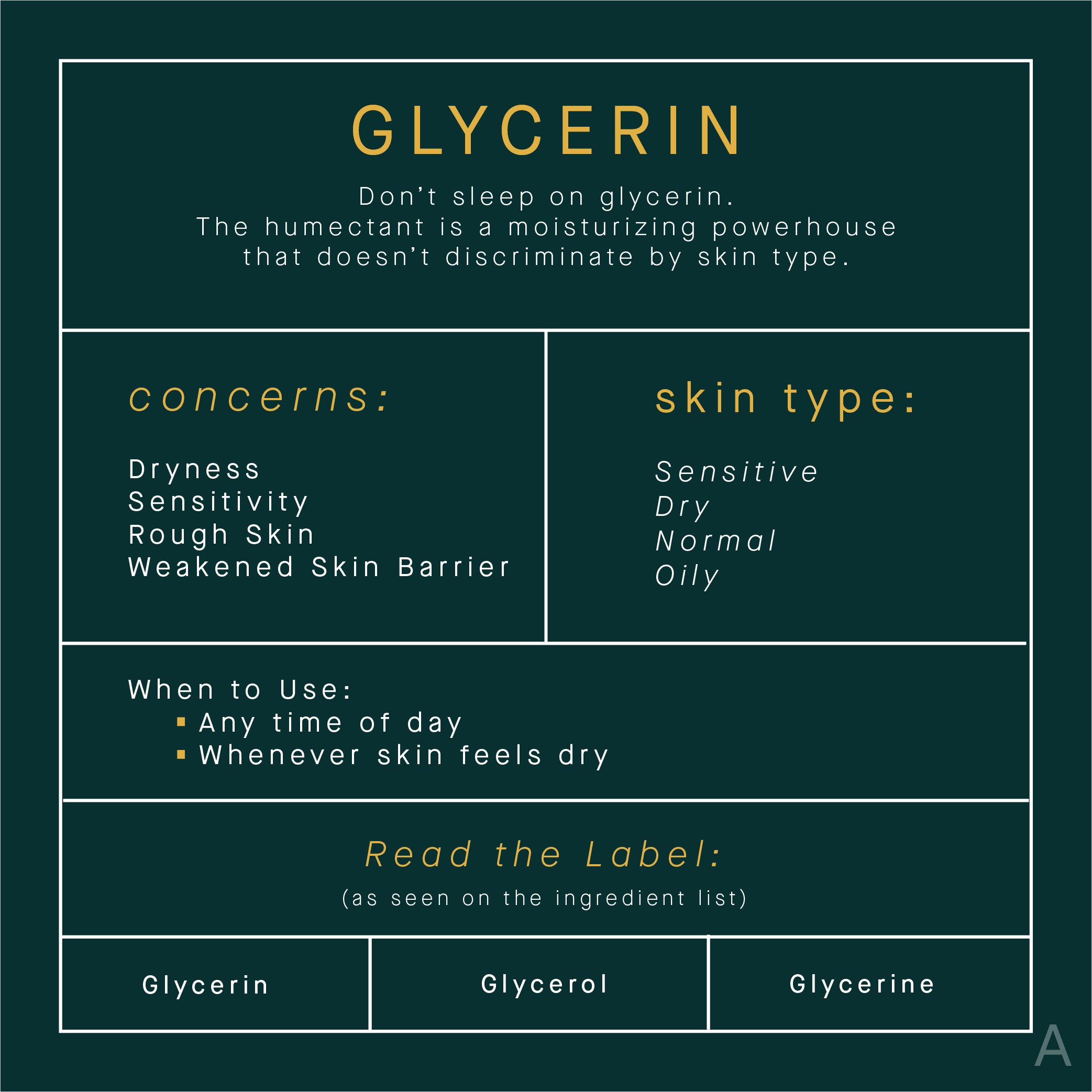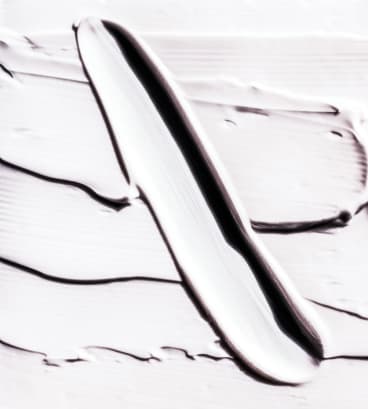 HydraFacial®
HydraFacial®Read The Label: All Your Glycerin Questions Answered
Don’t sleep on glycerin. This humectant is not only a moisturizing powerhouse, it also helps prevent moisture loss and doesn’t discriminate by skin type.
Feel like you need a dictionary every time you look at the ingredient list of a beauty product? Still unsure of the difference between retinol and retinoids? What about the unique benefits of vitamins B, C, and E? Are alpha and beta hydroxy acids the same thing? The skincare aisle can be overwhelming, but you don’t need a PhD in cosmetic chemistry to navigate it. With expert help, The AEDITION is demystifying and simplifying the beauty industry — one label at a time.
If you’re familiar with The AEDITION, you know that we love to cover potent ingredients and skincare products that can deliver mighty nutrients to revitalize from within. However, there’s also a lot to be said for gentler ingredients that restore the skin barrier and help preserve a dewy glow. Since moisture (or lack thereof) plays a big role in the health and quality of the skin, humectants — à la hyaluronic acid (HA) — play a vital role in skincare regimens at any age.
While HA may get the lion’s share of attention, glycerin is a highly effective humectant and is one of the simplest ingredients to incorporate into any routine. While it may play well with all, there are a few things to know about glycerin to ensure you get the most out of this skin quencher.
What Is Glycerin?
Glycerin acts as a humectant, which means it can draw moisture into the skin and help boost hydration levels. “[It] is a plant-derived, clear, and odor-free moisturizer that has numerous skincare benefits,” explains Tanuj Nakra, MD, a double board certified facial and oculoplastic surgeon in Austin, TX, and co-founder of AVYA Skincare. As far as where it comes from, glycerin “is a natural compound derived from vegetable oils or animal fats,” says Samer Jaber, MD, a board certified dermatologist and founder of Washington Square Dermatology in New York City, though the glycerin found in topical skincare usually comes from botanicals.
Glycerin has a low molecular weight that allows it, when applied topically, to penetrate deep into the skin. A 2016 study found glycerin to be the “the most effective humectant” when compared to fellow moisture-boosting heavyweights like HA, alpha hydroxy acids (AHAs), sorbitol, and urea.
The Benefits of Glycerin in Skincare
Because glycerin is a humectant, it “deeply moisturizes by pulling water into the skin,” Dr. Nakra shares. It attracts moisture from the air into the stratum corneum (read: the top layer of skin), and, due to its low molecular weight, it's able to continue to draw the moisture into the deeper layers of the dermis. “It draws moisture to your skin and keeps it there without adding any oil,” explains Nina Zilka, co-founder and CEO of Alder New York. “It also mimics skin’s natural moisturizing factor (NMF), which is what keeps our skin barrier healthy and allows it to act as a shield to keep hydration in and bacteria — which leads to acne among other things — out.”

That ability to support the skin barrier is what makes it ideal for those with damaged or sensitive skin. As such, you’ll often find glycerin in repariative pharmaceutical creams and formulas that target dry, dehydrated, or cracked skin. According to Dr. Nakra, the ingredient can also act as “a gentle cleanser that pulls oils from pores and effectively removes makeup.”
The Best Candidates for Glycerin
We rarely get to say this, but glycerin really can be beneficial for those with any skin type — from combination and oily to normal and dry and everything in between. “It is a great cosmetic ingredient that works for almost anyone and can be combined with most cosmetic ingredients,” Dr. Jaber confirms. With that said, Dr. Nakra notes those with dry skin will see the biggest impact from using products with glycerin. “Glycerin is very effective for dry skin, as it hydrates and does not overly strip natural oils from skin,” he says.
For similar reasons, it is also a good option for those with sensitive skin or skin that is sensitized (yes, there is a difference). Glycerin helps reinforce the weakened skin barrier (a leading culprit of sensitivity and irritation) and has a calming effect, but that’s not all. “It is ideal for those with oily skin and clogged pores, as its cleansing properties remove toxins safely and effectively – without stripping natural flora from the skin,” Dr. Nakra adds.
As with any ingredient, there is some chance (however small) that someone may not be able to tolerate glycerin. “Rarely, patients can be allergic to glycerin,” Dr. Jaber cautions. “So, if you develop irritated skin from glycerin, avoid it.” He does, however, offer this tip: “Using pure glycerin can sometimes irritate the skin, so, in those situations, dilute it.” Glycerin does not need to be the star ingredient in order to shine and it is not an ingredient that should be used in a silo, which leads us to...
Finding the Right Glycerin Product
Whether you realize it or not, you likely already have several glycerin-powered products in your vanity. First things first, glycerin plays well with others. “Glycerin blends very well with and enhances the effects of other active ingredients,” Dr. Nakra explains. That includes fellow humectants. “By including glycerin with hyaluronic acid, the humectant properties of the product are multiplied,” he shares. It’s benefits can also be boosted when paired with occlusives that help trap the moisture it attracts into the skin, and “glycerin also helps active ingredients like peptides deeply penetrate the skin, to produce maximum effects,” Dr. Nakra adds.
Because glycerin is so versatile, you will find it in a wide variety of formulations (think: everything from face cleansers and serums to hand creams and body moisturizers). “We incorporate glycerin into products where we want to add hydration,” Zilka says of Alder New York. That’s why you’ll find the ingredient throughout the brand’s ‘Everyday’ collection (we’re fans of the Everyday Face Serum). “It's a great partner to other hydrating ingredients, like hyaluronic acid and vitamin E, and skin balancing vitamin B3,” she notes. At AVYA Skincare, Dr. Nakra and his team have taken a similar approach. “We harnessed the power of glycerin in numerous products as it is a gentle cleanser, a calming hydrator, and an effective active ingredient enhancer,” he explains.
How to Add Glycerin into Your Skincare Routine
Perhaps the best aspect of this ingredient is the lack of planning you need in order to incorporate it into your skincare routine. “Apply it to your skin whenever it feels dry, as it can be used as often as you like in the morning or evening,” Dr. Jaber says. So, whether it’s in a cleanser (hi, La Roche-Posay Hydrating Gentle Soap Free Cleanser), serum (check out the Avène Hydrance Intense Rehydrating Serum), moisturizer (here’s looking at you, Paula's Choice Clear Oil-Free Moisturizer), or any other formula, glycerin-powered products can revive any kind of skin at any time of day.
The Takeaway
Gentle and moisturizing, glycerin is a great complement to any skincare regimen because it can be utilized whenever your skin is thirsty. It may not be as glamorous as some of the actives marketed at the front of product labels, but it more than pulls its weight in the hydration department and it makes everything it's formulated with better. What more could you ask for?
All products featured are independently selected by our editors, however, AEDIT may receive a commission on items purchased through our links.
More Related Articles
Related Procedures

AI Plastic Surgeon™
powered by'Try on' aesthetic procedures and instantly visualize possible results with The AI Plastic Surgeon, our patented 3D aesthetic simulator.

